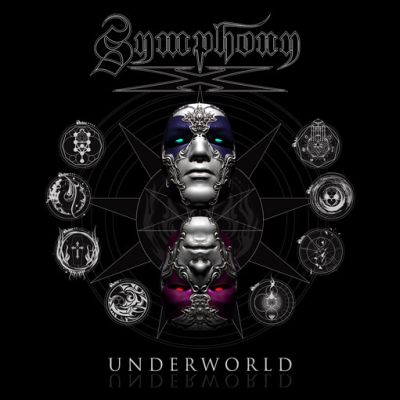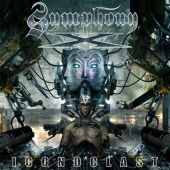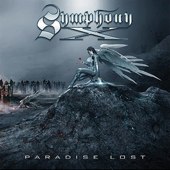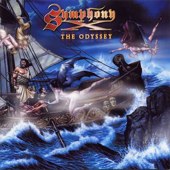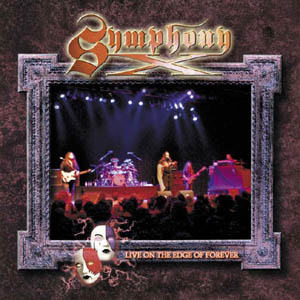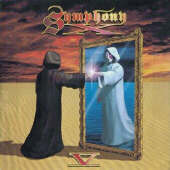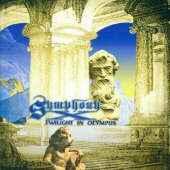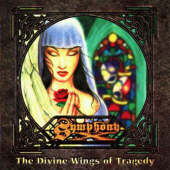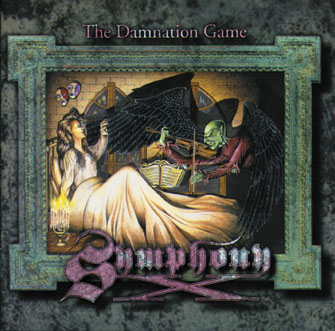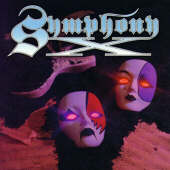Symphony X - Interview
Bassist Mike LePond, a mainstay of Symphony X, shares his passion for Brazil in an exclusive interview. With over two decades of history with the country, the musician recalls unforgettable moments, from the initial euphoria of a fervent audience to the experience of playing for thousands of fans in iconic venues. The special connection with the Brazilian audience is evident, and LePond promises an even more explosive and interactive show on the band's upcoming 30th anniversary tour. With a career marked by technique and passion, LePond reveals details about his musical trajectory. From his childhood influenced by the epic Kiss show to the construction of a unique style in the complex universe of progressive metal, the musician shares insights into his playing and composition. In addition, LePond talks about challenges faced and future projects, including a new Symphony X album.
Marcelo Vieira
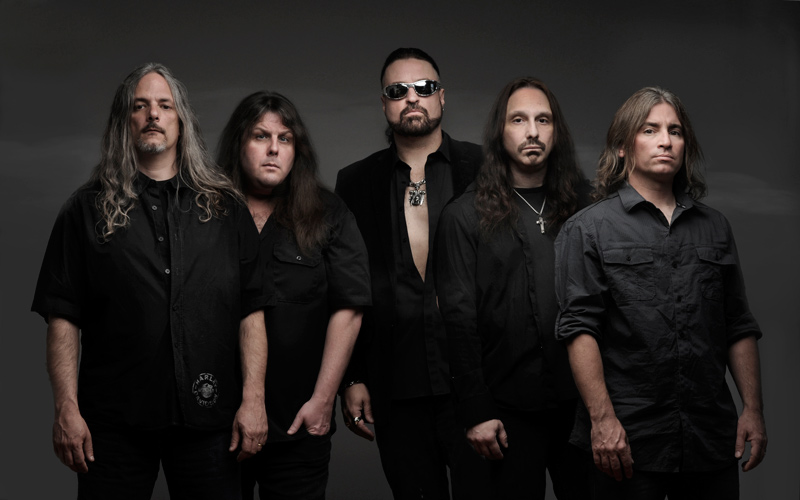
This is not the first time Symphony X will perform in Brazil. What are your impressions of the country?
Well, Brazil has a special place in my heart. The first gig I ever played with Symphony X was in Sao Paulo, Brazil. In the year 2000. And I never forgot it. The fans were just amazing. And so I always love coming back to Brazil. It brings back so many memories. And the fans appreciate heavy metal just as much, if not more, than any country we've ever played in.
Could you please share your most memorable moments from previous tours here?
Sure, I mean... We've been coming back... We've been playing Brazil for over 20 years now. And I think the greatest memory I ever had was... It was before the first gig there. I didn't know how popular Symphony X was. I was just the new guy. And I was told that we were going to do a meet-and-greet at some hall. And I figured maybe 10 or 20 people might show. And then when I entered the hall, I heard this loud roar. And I didn't know what that was. I was like, what's going on? And it was about 300 to 400 people waiting in line to get our autographs. And they were so excited. And I've never seen anything like that in my country, ever. And they were just so nice. They were so welcoming. They were all telling me, welcome to the band. We're so happy to see you play. It's just probably still the greatest memory I have of my career. That first impression of Brazil reacting to Symphony X. Not on the stage, but just on a one-to-one level.
The band has played at festivals like Rock in Rio and Monsters of Rock. Which show would you say was the most special for the band in Brazil?
I can remember... I remember we went there. We had just released the Paradise Lost album. And it was 2007. And now Symphony X, when we play... We play maybe, at the very most, a thousand people. At the most. So we were told that when we play Brazil, we were going to play a hall. I'm trying to think of the name. Is the name Credit Card Hall? So we go there. And I couldn't believe how big this place was. And we played to about 3,000 people that night. And that was the biggest crowd we ever played to. And they were just so amazing. And this had never happened to Symphony X anywhere in the world. So this was another incredible experience in Brazil. And when we come back to Brazil, we never know what we're going to expect. It's always a great experience with fans who just... You can tell that they're just waiting for this show for months. And it's here. And they're going to just make the most of it.
What can Brazilian fans expect from the 30th-anniversary tour shows?
Well, we always try to change the set list up a little bit. And we get so many requests for different songs. And I wish we could play them all and play for six hours. So we try to pick some songs that we think certain countries might like, just from requests that we may get. So let's see. We were in Brazil last year too. So the set list will be definitely different than last year. I'd say at least probably four different songs in the set. And it's fun. This set is going to be a lot more of crowd interaction. So it's not going to be so serious prog concert. It's going to be very rock and roll, very crowd interaction. And I think the Brazilian people will respond really well to it.
What do you think of the metal scene in Brazil?
Well, I know the fans very well. But I'm not very familiar with the Brazilian metal scene. Only because I don't hear too much about it in my country. Of course, I only know the big ones like Angra and Max Cavalera. I would love to know more about some of the popular metal bands over there right now. I really would love to know. So if anyone in your audience or you have suggestions, I would love to know about some cool bands.
Now, I'd like to talk a bit about your career. You mentioned attending a KISS concert at 13, and it sparked your passion for music. What specifically about the concert, or KISS, inspired you to become a bassist?
Well, you have to look at it this way. So I'm 58 years old right now. So if we go back to 1979, you know, Kiss is huge at the time. And I'm just 13 years old. And so Kiss is playing Madison Square Garden in New York City. This is the big show, you know. So my father takes me. And I'm looking around. And I get in the show. And in the mind of a 13-year-old, it looks like I'm looking at superheroes like Batman and Superman. And they come out of the floor when the show starts. And, you know, explosions everywhere. And my mind is blown. So I see Gene Simmons. He's spitting blood. Breathing fire. He's flying. And after that show, I told my father, you know, Dad, you know, I want to be a bass player. Can you buy me a bass? And he did. And that started my journey. And then, you know, as I got older, well, my first goal was to learn every Kiss song that was released at the time. Which actually back then, it was a good way to learn. Because Gene Simmons' bass lines were simple, but they fit the song nice. And it was real bass player type of bass lines. So I learned a lot. And then as I got older, I got into some of the other guys, you know, like Steve Harris and people like that.
Rush, Black Sabbath, and Iron Maiden are all major influences on you. How do you incorporate the styles of their bassists, Geddy Lee, Geezer Butler, and Steve Harris, into your own playing?
Oh, that's a very good question. Yeah, so all the people you mentioned, very big influences. I would also probably include Joey DeMeo from Manowar in that. You know, when I got introduced to Joey, I bought an eight string bass like he has. And it was a lot of fun. Well, you know, when I first joined Symphony X, I saw that their music, there were so many things going on. It's so complicated that there was very little room to throw that Giza Butler, you know, heavy blues bass line in there. So in many cases, I couldn't do too much because it was just too busy. Like you would have, let's say you would have Michael Romeo playing this heavy riff. And then you would have Michael Piniella on the keyboard doing a counter riff. So you have so much going on. And if I did my own thing, it would be too much, just too much to handle for the listener. So I had to learn to just play tight with the guitar or play tight with the drums. And if there was a little space, I would have to look around for the spaces in the song. And if I found a little space, I could throw that lick in, you know, that cool lick from my youth. But I had to learn how to play this kind of music because the only influence that I was able to draw from was Rush. And Symphony X was even more progressive than Rush. So it took a lot of time to learn. But at this point, I pretty much know, you know, what everybody likes to do. And it's a lot easier.
You've recorded five albums with Symphony X. Do you have a favorite era or album where you feel your bass lines really shine?
Let's see. I'm trying to think of an album where the bass lines are loud. I mean, I wish my bass lines were a little louder on the albums. That's my one critique. But I think on the five album is where you could hear the bass nice and loud. And I think I did a lot more playing on that record. The other albums were actually a little more complicated and a lot more going on with the orchestra. And so I had to play a lot less. But I would say the five record would be the one that I'm probably the most proud of.
It's been almost ten years since the release of "Underworld." Are you already thinking about or working on a new album?
Yes. Michael Romeo has been working hard on new ideas, new parts. And new concepts for the lyrics. So it's definitely being written. I would imagine we'll probably start recording it. I would say probably early next year. And hopefully get it released by the end of next year. So it's definitely in the works. I've sent him some lyrics. I've sent him some music. And he's got hours of music already. So we're looking forward to finally doing this again.
What do you like most about being a part of Symphony X?
You know, there's a few things I like. We've had the same lineup since I joined the band. And that was in 1999. So one thing I like is when we're not touring, we really don't communicate that much. But then once we tour, we all get back together. And it's great to catch up with all the guys. And we have that brotherhood. So I love that as far as the band goes. And also I love the reactions. Our fans are really, really great to us. You know, they want to tell us how we inspire them. They want to tell us how our music has changed their lives. So they tell us how much, you know, what an inspiration we are to them and their lives. And it makes me feel, you know, it just makes you feel so good to know that your music has made a difference to people. And in some cases, it has really been a positive to someone's life. So those two are probably the most important to me.
You've collaborated with various bands and even have your solo project, Mike LePond's Silent Assassins. How does your creative process differ between these projects compared to Symphony X?
Well, Symphony X is, you know, no one sounds like Symphony X. It's its own sound. My solo stuff, the Silent Assassins, is closer to what I grew up with, you know. So when I grew up, you know, I loved, of course, from my age group, I loved Judas Priest and Black Sabbath and Iron Maiden and all those bands. So the stuff that I write for the Silent Assassins is more geared towards that, you know, classic heavy metal, power metal, whatever you want to call it. So that gets my other, that's, you know, that for my creativity, that really helps me because that's still part of me. So it's a great creative outlet to have that. And I'm very proud of what I did with the Silent Assassins. And with the Silent Assassins, I write music a little differently than Symphony X would, you know. I'll just sit down and I'll write a song, but I won't record it. It'll just be in my head. And then I'll eventually go to a studio and record it there. And hire different people. So it's not a band feeling. It's just, you're hiring friends that you really appreciate their ability. And, you know, the end process is great because in the Silent Assassins, I write the lyrics, I write the music, I produce. And it's a lot of work, but it's very rewarding at the end.
Is there any artist from another musical genre you would like to collaborate with in the future?
That's something I never really thought about. Collaborating with other artists. I mean, there's many artists that I really, really respect, you know. I probably would like to collaborate with either Hansi, maybe from Blind Guardian. Or John Schaefer from Ice Dirt. Or, you know, somebody like that. Bands where the music is very serious and well written. Something to that effect. I can't think of anybody else, but I'm sure there's a lot more.
Having played with various bands, what advice would you give to bassists looking to find their place in the music industry?
How I would advise bass players would be this. Do not try to learn the hard stuff first. Start off with very easy stuff. Like I did. I've met a lot of bass players. They see Dream Theater or Symphony X and they want to play like that. So they learn all these hard things. But then if you wanted to play maybe a simple blues kind of jam or song, they don't know what to do. So, learn very easy stuff first. Pick up an ACDC album and listen to the backbeat. Just play the bass along with the drums and get your timing really, really good. Or like I did, learn some KISS songs where the bass walks around. It's not difficult, but it's really important to the song. And then eventually you get into some of the harder stuff and you'll become a much better bass player. My other advice would be to listen to many different kinds of music. Something that I did not do in the beginning. I was just Mr. Metal Guy. And I realize now that there's so much to learn from other kinds of music. And listen to other musicians, not just bass players. Like for example, with the Silent Assassins, I really was influenced by what Richie Blackmore was doing in Blackmore's Night.And a lot of the bass lines on that solo project are very much influenced by what he was doing in that band. So, I think those three things are the most important.
How would you describe yourself as a bassist?
I'm a type of bass player where I like to play tight in the pocket. I would rather not do solos unless the song needs it. I am much more impressed with a bass player picking a cool note to change in a chord rather than doing a really fast finger exercise. Sometimes I'll hear a bass player, and the chord will change, but I'll hear a bass player maybe play a harmony note instead of the root. And I'll be like, oh, beautiful. That's beautiful. That's what I get excited about. And I like doing things like that. I like playing, always listening to the bass drum, and how the drummer is playing the song, and just being really conscious of being tight with the band. And, you know, sometimes if you get some room, you throw a nice little solo thing in. But for me, it's all about playing what's best for the song instead of what's best for me.
And as for my final question, What would you say were the biggest challenges you've experienced in your career?
Excellent question. There's two challenges. Obviously, the first challenge was my auditions for Symphony X. Because before Symphony X, as I said before, the bands I was playing in, it was like Judas Priest and Kiss and that kind of stuff. And Symphony X was a whole different level. So I had to really practice for hours and hours and hours to prepare for that audition. So that was my first big challenge. The second challenge, which I still face, is, you know, I have stomach problems. I have something, I don't know what the translation is, but in English, I have something called Crohn's disease, and that's a stomach problem. So for my whole career in Symphony X, I've had many shows where I'd be, you know, I'm always in pain. And I try to go on stage and look cool while I'm dying in pain. I remember one show in Rio. It comes to mind as I'm talking to you where really, really was tough to get through. So that's always a constant struggle. But besides that, I feel so blessed and so lucky to be in Symphony X. I couldn't ask for anything better.
Video version here: https://youtu.be/ftvL4cQ7OLM
Discography
Upcoming Releases
- Morrath - Obscure Abominations - Feb 25
- Chalice - Divine Spear - Feb 27
- Blackwater Drowning - Obscure Sorrows - Feb 27
- Vide - Aux Enfants Des Ruines - Feb 27
- The Leaving - The Leaving - Mar 06
- Serpent Icon - Tombstone Stories - Mar 06
- Insect Inside - Reborn In Blight - Mar 06
- Triumpher - Piercing The Heart Of The World - Mar 06
- Lömsk - Act II - Of Iron And Blood - Mar 06
- God Against Humanity - The Judgement - Mar 06
- Miserere Luminis - Sidera - Mar 06
- Gravemass - This Is The Way - Mar 06
- No/Más - No Peace - Mar 13
- Monstrosity - Screams From Beneath The Surface - Mar 13
- Against I - Anti Life - Mar 13
- Empire Of Disease - While Everything Collapses - Mar 19
- Hanging Garden - Isle Of Bliss - Mar 20
- Putred - Blestemul Din Adânc - Mar 20
- Gaerea - Loss - Mar 20
- Diatribes - Degenerate - Mar 20

